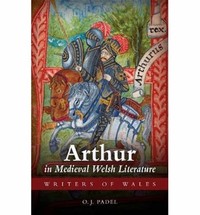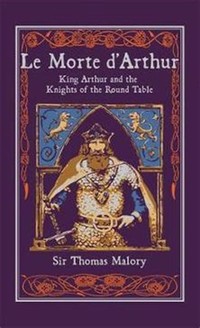Facts about Arthur

One school of thought sees Arthur as a shadowy historical figure, a Romano-British leader fighting against the invading Anglo-Saxons sometime in the late fifth to early sixth century.

Some cite a possible etymology of Arthur's name from Welsh arth, "bear," and propose the Gaulish bear god Artio as a precedent for the legend of Arthur.

The creator of the familiar literary persona of Arthur was Geoffrey of Monmouth, with his pseudo-historical Historia Regum Britanniae ("History of the Kings of Britain"), written in the 1130s.

Geoffrey places Arthur in the same post-Roman period as do the Historia Brittonum and Annales Cambriae.

The development of the Arthurian cycle culminated in Le Morte d'Arthur, Thomas Malory's retelling of the entire legend in a single work, in English, in the late-fifteenth century.

Modern interest in Arthur was revived by Tennyson in Idylls of the King.

Arthur appears in a number of well-known vitae ("lives") of sixth-century saints, most of them written at the monastery of Llancarfan in the twelfth century.

The Welsh Mabinogion collection contains three Arthurian romances, similar to those of Chrйtien, but with some significant differences.

The historicity of the King Arthur legend has long been debated by scholars.

A notable stylistic aspect of medieval Arthurian literature is that it is invariably anachronistic, applying the conventions of chivalric Christian society onto a much earlier era.

The subsequent period saw the creation of hundreds, perhaps thousands of books, poems, and films about King Arthur, both new works of fiction and analyses of the relevant historical and archaeological data.

According to the Life of Saint Gildas, written in the eleventh century by Caradoc of Llancarfan, Arthur killed Gildas' brother Hueil, a pirate, on the Isle of Man.

Arthur and his warriors, including Caius, Bedver, and Walganus—later known as Kay, Bedivere, and Gawain—defeat Lucius in Gaul.

Medieval Arthurian writing reached its conclusion in Thomas Mallory's comprehensive Morte D'Arthur, published in 1485.

Various sites and places have been identified as "Arthurian" since the twelfth century, but archeology can reveal names only through inscriptions.

Arthur appears in some of the lais of Marie de France, but it was the work of another French poet, Chrйtien de Troyes, that had the greatest influence.

Countless new legends, stories, revisions, books, and films have been produced in Europe and the United States that unabashedly enlarge on and expand the stories of King Arthur.

On Uther's death, the 15-year-old Arthur succeeds him as king and fights a series of battles, similar to those in the Historia Brittonum, culminating in the Battle of Bath.

Le Morte D'Arthur was one of the earliest printed books in England, published by William Caxton in 1485.

Griffith then filmed the first movie ever shot in Hollywood, In Old California (1910), a melodrama about California in the 1800s, while it was still part of Mexico.

The central themes of the Arthurian cycle vary depending on which texts are examined.

Arthur's name appears as Arturus in early Latin Arthurian texts, never as Artorius, although it is possible that Vulgar Latin forms of Artorius, pronounced in Celtic languages, could have yielded both Arthur and Arturus.

Gildas' sixth-century polemic De Excidio Britanniae (On the Ruin of Britain), written within living memory of the Battle of Mons Badonicus, speaks of the battle but does not mention Arthur.

The legendary Arthur developed initially through the pseudo-history of Geoffrey of Monmouth and the Welsh collection of anonymous tales known as the Mabinogion.

Bewnans Ke, a play in Middle Cornish held by the National Library of Wales, is a recent Arthurian discovery.

Key modern re-workings of the Arthurian legends include Mark Twain's A Connecticut Yankee in King Arthur's Court, T.H.

The popularity of the stories of King Arthur have captured interest far beyond his being the legendary hero of one nation.

The earliest literary references to Arthur, however, are found in Welsh poetry.

The popularity of Geoffrey's Historia and its derivative works led to new Arthurian works being written in continental Europe, particularly in France, in the late twelfth and early thirteenth century.

The French writer Chretien de Troyes began the literary tradition of Arthurian romance.

Toby D. Griffen of Southern Illinois University links the name Arthur to Arcturus, the brightest star in the constellation Boцtes, near Ursa Major, or the Great Bear.






